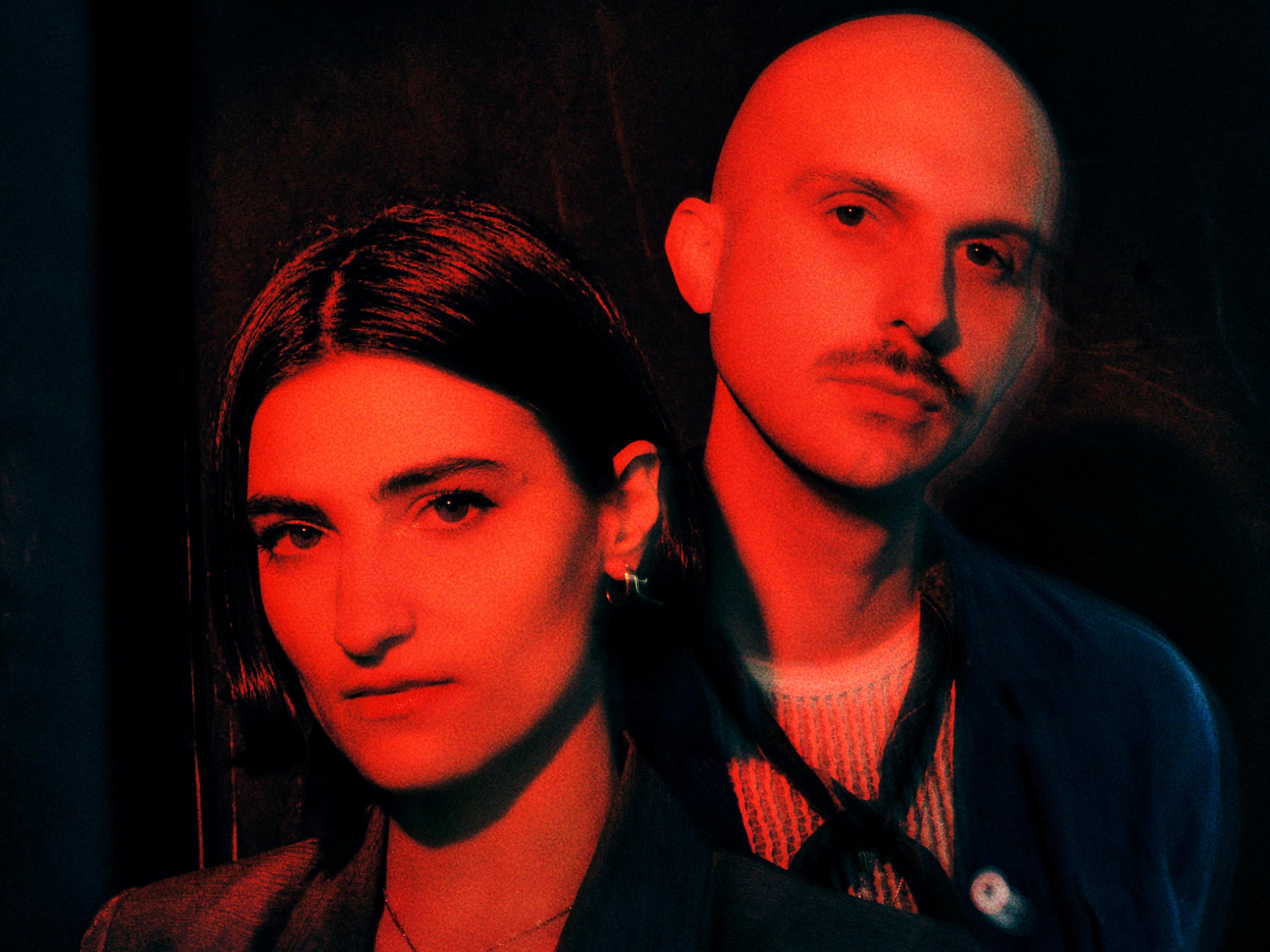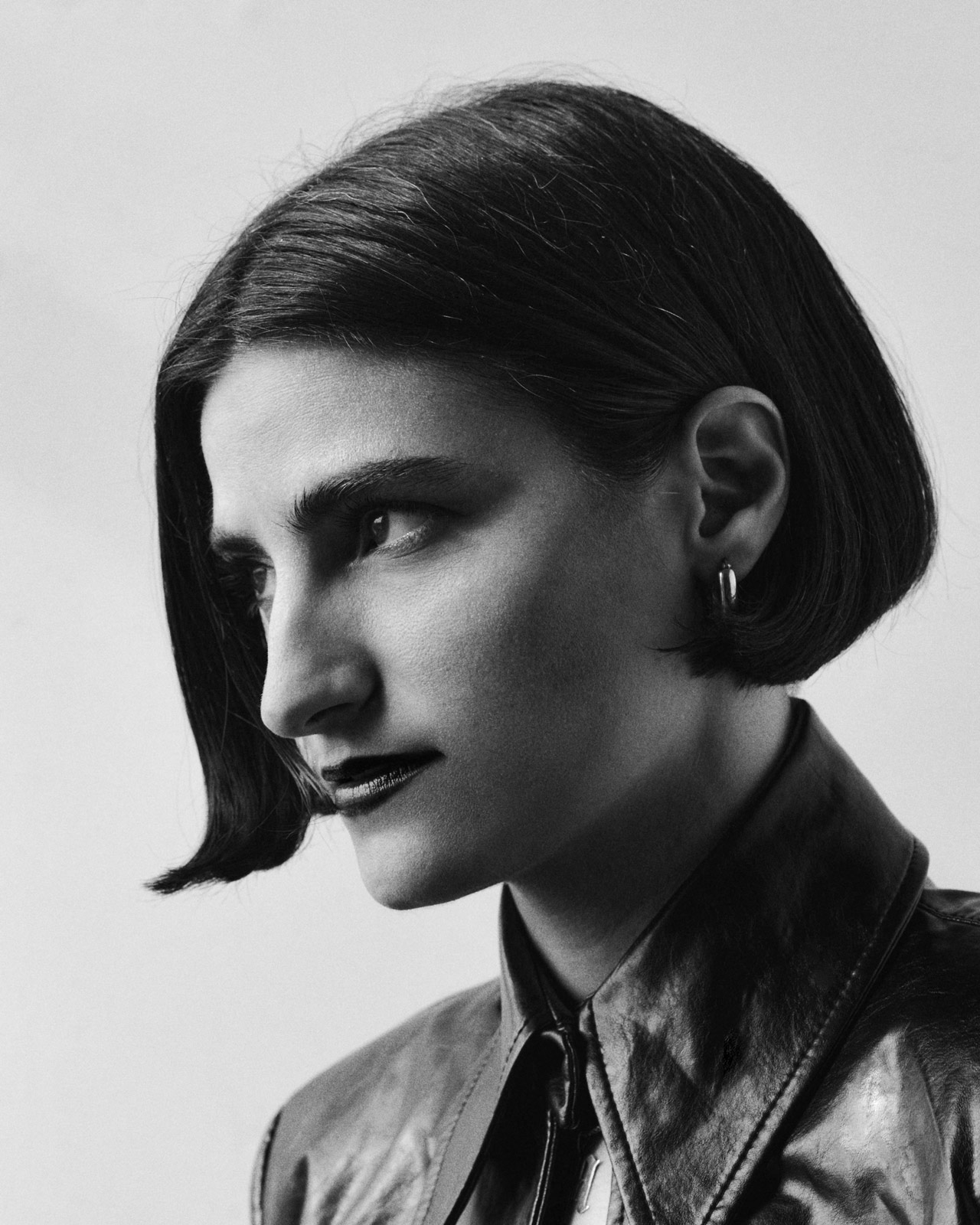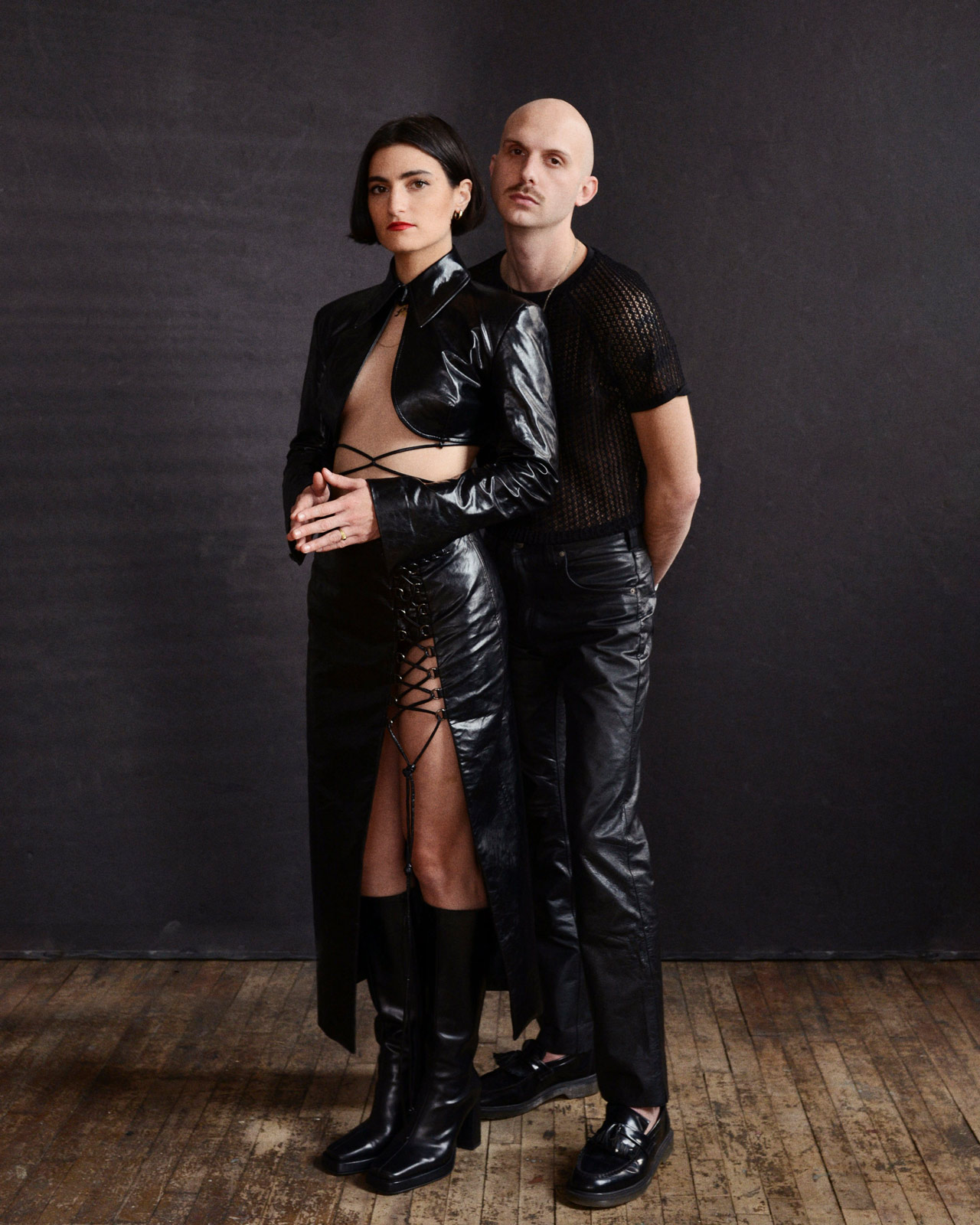On the eve of their third album release, the duo discusses creative partnership and sticking to their guns
“Тhе ѕіrеnѕ аrе саllіng іn / Lеt mе knоw whеn уоu саn brеаthе аgаіn,” Mattiel Brown sings on the single, “Lighthouse.” “І аm thе lіghthоuѕе / І’ll lеаd уоu аlоng.” Indeed, when Brown sings in her expressive, commanding alto, she is a guide—a guide into the world she’s constructed alongside the other half of her band: drummer, producer, and guitarist Jonah Swilley. Having recently released their third album, titled Georgia Gothic, the duo, which performs under the name Mattiel, has fine-tuned their visual and sonic landscapes, creating a cohesive experience rather than simply a series of songs. Brown’s lyrics, rich with symbolism, explore themes of longing, passion, and the fiery abandon that comes with losing it all. She bolsters her words with a background in graphic design, providing distinctive art direction that evokes the cinematic dark magic of directors Alejandro Jodorowsky and Anna Biller. The music video for the single “Blood in the Yolk” is a striking homage to Sergei Parajanov’s The Color of Pomegranates, and perfectly encapsulates the internal dynamic responsible for Mattiel’s success: Brown’s literary lyrics and artistic vision coupled with Swilley’s impressive musical mastery.
Document caught Mattiel the day after the two New York performances of their tour—the very beginning of a several-month stint across the United States and Europe. We began our interview with a tarot reading, with Swilley drawing the three of cups, a card that indicates joy, community, and creative collaboration—appropriate for a duo embarking on a celebratory journey after years of work and in the ever-lingering wake of lockdown. Over the sound of grinding coffee beans in an East Williamsburg café, we discussed the making of Georgia Gothic, Mattiel’s first tour—a dream opportunity supporting Jack White—and the power of staying present during live performances.
Maraya Fisher: What does the album name Georgia Gothic mean to you?
Mattiel Brown: It’s descriptive language to bring the listener into our own world and our environment, which was, at the time we were writing, all in Georgia—specifically in North Georgia where we rented a cabin to write these songs together.
Maraya: As a listener, I do feel as if I am being brought into a world. Do you ever feel like you are embodying characters as you write or perform your songs?
Mattiel: Yeah. With ‘How It Ends,’ I don’t even know how those words came to my brain. But it ended up being something that kind of sounded like some executive dude in a suit that like, things weren’t working out for him anymore, and he decided to off himself. It’s really weird; I don’t know where that came from.
Jonah Swilley: That’s cool, I didn’t even know that.
Mattiel: I just felt this really angry energy at the time, that was, like, blowing [laughs]. And I was just like, ‘Ok, I’ll just go with this.’ I don’t know what the story was with bringing that song structure together. It was sitting in a Dropbox folder that Jonah made for a while. I went back on my phone and listened to a few things, and I was stuck on that song, and then I started to write.
Jonah: I was trying to make something that sounded like Happy Mondays. That was one we wrote before the cabin. We did that in isolation. It was like the first month of quarantine.
Maraya: So the cabin retreat happened at the beginning of quarantine.
Jonah: Yeah. It was in July, so we hadn’t seen each other in a couple of months. We were just then starting to hang out again.
Maraya: Did you have a backlog of creative ideas from the lockdown?
Jonah: I was pretty fresh on my end.
Mattiel: Yeah, it was just spontaneity there. I didn’t come with pre-written words or lyrics or anything; it was all written in that cabin.
Maraya: You had two albums before this, did the process differ greatly?
Mattiel: Yeah, we had more time to devote to this one because we weren’t working our part-time or full-time jobs.
Jonah: The combination of that with the pandemic just allowed for us to be able to focus on the album.
Maraya: Do you think your approach to music has changed since going through the pandemic?
Mattiel: I’m able to be more grateful about things. I feel like it changed my perception on that front.
Jonah: We’re also just doing stuff we want to do. Something about COVID just kind of got rid of the bullshit. The whole goal is to get signed and get a label and stuff, but then you get successful and people start telling you what to do and you’re like, ‘We’re already doing what we do. Let us do what we do.’ Something about COVID made us just stick to our guns.
Mattiel: It feels good to feel good about the record. From start to finish.
Maraya: When writing, do you typically start with the instrumentation?
Mattiel: Most of the time, yes.
Jonah: At the cabin, I would just be playing stuff and see what Mattiel was thinking. My goal, always, is to get her going. I want to make her excited because then I know she’ll write something great. Chords that you like—I would try to figure out a way to make it work in a song.
Maraya: Do you have any methods for when you get creatively stuck? Do you ever turn to other forms of art?
Mattiel: Yeah, I love going to art museums. I love looking at archeological stuff. It gives you this broad view of history, design, and art. It’s very inspiring to go and look at, like, Greek sculptures.
Maraya: Your visuals and sound are so cohesive, and I feel like they really inform each other. What are the visual influences that you gravitate towards?
Mattiel: I like to design things with a specific color palette that’s decided. For this album, it’s bright, hot red, which is really fun. I was waiting for the right time to use hot red because it’s such a powerful punch, and it’s such a good match for this record. I love pop art, I love things that are balanced. I have a lot of talented friends—Jason Travis shot the cover of us on Georgia Gothic—
Jonah: He did the first two albums, too.
Mattiel: Yeah, he just understood what my vision was. I got some leather outfits for us on the internet, and I painted these two big pitchforks with bright red spray paint. Then we went out to the kudzu patch.
Jonah: While we were shooting that cover—we were in this neighborhood in Atlanta—all these people were stopping by and looking at us [like we were] absolutely insane. They thought we were dressing up for Halloween or something.
Maraya: I love talking to musicians who aren’t from LA or New York. What keeps you in Atlanta and how do you think that affects your sound?
Mattiel: It’s very isolated in a way.
Jonah: I’m married and Mattiel’s been in a very long relationship; I think if we weren’t in relationships, we’d probably be in Europe by now. Unfortunately, right now, it’s maybe not the place to be, but that’s kind of the goal. My whole family is in Georgia, so that’s what keeps me there. And Mattiel’s mom is there.
“It kind of felt like getting thrown in the deep end when you don’t know how to swim very well, and you kind of just have to figure it out.”
Mattiel: My mom has a farm in Georgia, so my whole life has been that house.
Maraya: Do you feel the artistic influence of the city?
Jonah: I feel like what we do isn’t specifically Atlanta, but I think it represents the city pretty well.
Mattiel: It feels good to take it overseas and then come back, and radio stations and all of our friends are really supportive and feel like we’re representing the city in a cool way, internationally.
Maraya: A good creative partnership is hard to find. How did you guys meet?
Jonah: We were 21. I was in a band; we were recording a lot in Atlanta. Mattiel hit up my partner at the time and was like, ‘Yo, I want to record a song.’ I think she recorded a Johnny Cash cover, and I was like, ‘This is really dope.’ Then we ended up meeting, and she and I connected.
Maraya: What is it about the other person that allows you to be creatively compatible?
Mattiel: Jonah’s music knowledge is very vast. He’s a drummer first and plays every other instrument amazingly. It blows my mind.
Jonah: We just trust each other. We trust what the other is going to do. I think it takes a while to get there sometimes.
Mattiel: My side of things is more like visual marketing and writing, I guess, but also the concept and art.
Maraya: Do you think your background in design informs the music itself?
Mattiel: Usually the music comes first. It’s recorded and produced and mastered, and then I can figure out how I want to present that piece of work that we made in a visual way afterwards.
Maraya: Do you put a similar amount of time into each song?
Jonah: ‘Jeff Goldblum’ was a piece of cake. It’s a simple song but it just came really easy. And some other songs we tweak a little bit. We added a chorus to ‘Lighthouse’; it originally didn’t have a chorus.
Maraya: Do you ever get Jeff Goldblum stans in your mentions?
Mattiel: Kind of! It’s just a fun song. It’s also hugely catchy. I just love the song itself.
Maraya: It’s been in my head all day!
Jonah: It’s kind of just like a little nod to him. We love Jeff Goldblum.
Maraya: How do you guys stay sane while touring?
Jonah: I meditate every day.
Mattiel: Yes, Jonah is an excellent meditator.
Jonah: And, weed helps [laughs].
Mattiel: I think the pre-show routine is more of a thing for me. Like stretching and like getting ready and stuff, and doing a small workout to get my blood flowing. That’s really important, otherwise I’m kind of stiff.
Maraya: Performing is such an expenditure of energy, especially as a two-piece, because you have to be on the entire time.
Jonah: It’s all on you when it’s a small group. Like, if a bigger band is playing, you can kind of rely on each other.
Mattiel: It feels cool to be controlling the show from the stage. There’s our sound engineer at every venue, but that’s it.
Maraya: What do you want from an audience when you perform?
Mattiel: I mean, the energy from the audience is everything.
Jonah: We want their attention. I try not to get super bummed out when someone is obviously on their phone—
Mattiel: Like, I will call you [the audience] out sometimes.
Jonah: Especially if you’re on it a lot. If you’re looking at your phone while you’re playing like…
Maraya: … Why are you here? Did you guys see the Mitski tweet about phones at shows? She essentially expressed that she didn’t mind photos but thinks filming a whole set detracts from the communion between artist and audience.
Jonah: That’s real!
Mattiel: Yes! Jack White didn’t allow phones at his shows when he took us on tour. And that was a great move. It was magical.
Jonah: You saw everyone’s face.
Maraya: Everyone is in the moment with you. That’s the point of live music.
Mattiel: Yes! And they worked really hard to do that. They had little cases that you had to put your phone in and leave at the door—this whole setup just to have people not have their phones.
Maraya: What else did you take away from that tour with Jack White?
Mattiel: Jonah had already toured with Jack White before, but that was my first tour ever.
Jonah: It kind of felt like getting thrown in the deep end when you don’t know how to swim very well, and you kind of just have to figure it out.
Mattiel: But we totally did.
Jonah: We did and it worked. But like, we could have sucked. In front of a lot of people. He put a lot of up-and-coming artists on that tour. I like that he trusted that everyone was going to do a good job.
Maraya: I can’t believe that was your first tour. How did you feel when you got it?
Mattiel: It was like a dream come true. At the time, it was like going to the moon. Like, you don’t get to go to the moon—who gets to do that? [Laughs]
Maraya: Are there any other dream artists who you would want to tour with?
Mattiel: Florence and the Machine would be so great.
Jonah: Yes. I would love to tour with somebody that’s not in our realm. Like a rap artist or something.
Maraya: Do you have any other musicians or visual artists who come to mind as influences?
Mattiel: Nadia Lee Cohen. She has a book of characters coming out. She’s this great photographer—she’ll dress up as an old country farmer or as some cashier at a burger joint. Then she has all these accessories, and it looks so real.
Maraya: I feel like music releases are so single-based and the emphasis is really taken off albums as whole.
Jonah: The key for us is for people to buy the actual record. Because it makes going through it a whole ritual or experience. That’s how I listen to full albums. Like, I never listen to a whole album on Spotify. So I’m a part of the problem [laughs]. But, like, buy the CD and put it in your car.
Mattiel: Yeah, having a physical copy is becoming maybe more important.
Maraya: As someone who has worked in print media, I agree with that.
Jonah: Yeah, you just have a different connection to it.











